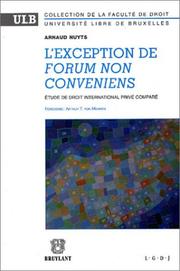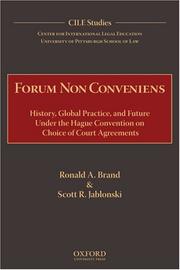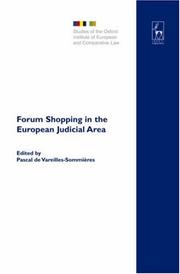| Listing 1 - 10 of 13 | << page >> |
Sort by
|
Book
ISBN: 3725520194 Year: 1979 Publisher: Zürich : Schulthess polygraphischer Verlag,
Abstract | Keywords | Export | Availability | Bookmark
 Loading...
Loading...Choose an application
- Reference Manager
- EndNote
- RefWorks (Direct export to RefWorks)
Book
ISBN: 1509925767 1509925775 9781509925766 9781509925773 Year: 2019 Publisher: London : Bloomsbury Publishing,
Abstract | Keywords | Export | Availability | Bookmark
 Loading...
Loading...Choose an application
- Reference Manager
- EndNote
- RefWorks (Direct export to RefWorks)
"The forum (non) conveniens doctrine provides the basis for the discretionary exercise of jurisdiction by English courts in private international law disputes. London's pre-eminence as a centre for international commercial litigation has led to the frequent deployment of this doctrine in proceedings where parties disagree over where the case should be heard. The doctrine's significance is not limited to England but extends to many Commonwealth jurisdictions which have embraced it. This is the first book-length study devoted entirely to examining the forum (non) conveniens doctrine's past, present, and future from the perspective of the law in England. By offering a meticulous and critical analysis of relevant historical and contemporary sources in England and elsewhere, it seeks to fill gaps in relevant knowledge of the English forum (non) conveniens doctrine, and to challenge certain views concerning its operation that have come to be regarded as representing the orthodoxy. In this respect, the book attempts to refine our understanding of the doctrine's historical development, evaluate its application in the years following its formal recognition in England, and examine the case for revising it, given the changing nature of international commercial litigation in recent decades. The book's ultimate objective is to act as an authoritative and a comprehensive reference point for those with an interest in the forum (non) conveniens doctrine, more specifically, and cross-border private litigation, more generally."--Bloomsbury Publishing.
Book
ISBN: 9783631631263 363163126X Year: 2012 Publisher: Frankfurt am Main: Lang,
Abstract | Keywords | Export | Availability | Bookmark
 Loading...
Loading...Choose an application
- Reference Manager
- EndNote
- RefWorks (Direct export to RefWorks)
Forum non conveniens --- Judicial assistance --- Civil procedure
Book
ISBN: 1472564197 1281357308 9786611357245 1847314015 Year: 2007 Publisher: Oxford, Eng. ; Portland, OR : Hart Pub,
Abstract | Keywords | Export | Availability | Bookmark
 Loading...
Loading...Choose an application
- Reference Manager
- EndNote
- RefWorks (Direct export to RefWorks)
"One of the issues left untouched by the Brussels Convention of 27 September 1968 (and by the Brussels-1 Regulation replacing it) concerns the leeway left to domestic courts when applying European rules on international jurisdiction in civil and commercial matters. For instance, is the court under a duty of strict compliance with the jurisdiction rule as it is drafted? Would such a duty go so far as to require the court to abide by the jurisdiction rule, even though it is being used by one of the litigants to achieve an unfair result, for example to delay adjudication on the merits? Under what conditions may the Court decline jurisdiction on account of any unsuitable forum shopping, thus ruling out the European provision on jurisdiction? Recent litigation in the ECJ has yielded rather, even excessively, restrictive answers, ruling out any discretion by domestic courts to remedy any inconvenience arising from the strict application of the European provisions, if such discretion were provided for by the lex fori (the Gasser case, the Turner case, and the Owusu case). This series of rulings from the ECJ raises several questions. Most observers have questioned the appropriateness of prescribing a blind application of European rules on jurisdiction by domestic courts, relying on the legal traditions of EC Member States usually providing for corrective mechanisms - such as 'forum non conveniens' in English Law and 'exception de fraude' in French Law - in cases when a party abusively triggers the jurisdiction of a court in order to obtain an unjust advantage, thus practising unacceptable forum shopping. The time has now come for an analysis, under both Community and comparative law, of the ramifications of the recent Gasser/Turner/Owusu cases. Readers will find in this book a collection of studies by some of the leading English and French experts today, analysing the ins and outs of jurisdiction and forum shopping in Europe."--Bloomsbury Publishing.
Civil procedure --- Forum non conveniens. --- Forum shopping --- Jurisdiction
Book
ISBN: 019985534X 1283116081 9786613116086 0199745080 Year: 2007 Publisher: New York : Oxford University Press,
Abstract | Keywords | Export | Availability | Bookmark
 Loading...
Loading...Choose an application
- Reference Manager
- EndNote
- RefWorks (Direct export to RefWorks)
Giving an in-depth analysis of the doctrine of forum non conveniens as it has evolved, this book focuses on four major common law countries - UK, US, Canada, and Australia. It analyzes the similarities and differences of the doctrine among those four countries, comparing this to analogous laws found in civil law countries.
Forum non conveniens. --- Conflict of laws --- Jurisdiction. --- Jurisdiction --- Inconvenient forum --- Transfer of cause
Book
ISBN: 276375239X 2763752381 9782763752396 Year: 2020 Publisher: Quebec
Abstract | Keywords | Export | Availability | Bookmark
 Loading...
Loading...Choose an application
- Reference Manager
- EndNote
- RefWorks (Direct export to RefWorks)
Le débat est animé concernant les entreprises multinationales qui bafouent les droits de l'homme lors de leurs activités à l'étranger et la question de l'accès de leurs victimes aux tribunaux est récurrente. Bien qu'elles soient centrales lorsqu'un procès est envisagé, les règles de procédure, techniques par nature, sont souvent reléguées au second plan. Il en va ainsi du forum non conveniens, une doctrine selon laquelle un juge canadien compétent peut renvoyer un litige devant le tribunal du pays hôte. Or, cette doctrine est problématique relativement à la responsabilité des entreprises multinationales : si la justice ne peut être rendue, la responsabilité sociétale des entreprises n'est-elle pas qu'un miroir aux alouettes au Canada ? Cet ouvrage présente la doctrine du forum non conveniens de manière historique, synthétique et critique et revient sur l'actualité entourant le phénomène de judiciarisation de la responsabilité sociale des grandes entreprises, tant au Canada qu'aux États-Unis et en Europe. En exposant les plus récentes décisions judiciaires canadiennes dans ce domaine, cet ouvrage démontre que les juges ont tendance à accueillir plus favorablement les victimes étrangères dès lors que la responsabilité extracontractuelle d'une entreprise multinationale pour des violations des droits de l'homme est invoquée.
Book
ISBN: 1316120147 1316133222 1316612864 1316132137 1316129950 1316131041 113923563X 1316128865 131612777X 9781316131046 9781139235631 9781316129951 9781316121238 1316121232 9781316128862 9781316612866 9781316132135 9781316127773 9781107028050 1107028051 132288207X 9781316120149 9781316133224 Year: 2015 Publisher: Cambridge Cambridge University Press
Abstract | Keywords | Export | Availability | Bookmark
 Loading...
Loading...Choose an application
- Reference Manager
- EndNote
- RefWorks (Direct export to RefWorks)
This book studies the U.S. Supreme Court and its current common law approach to judicial decision making from a national and transnational perspective. The Supreme Court's approach appears detached from and inconsistent with the underlying fundamental principles that ought to guide it, which often leads to unfair and inefficient results. This book suggests the adoption of a judicial decision-making model that proceeds from principles and rules, using them as premises for developing consistent unitary theories to meet current social conditions. This model requires that judicial opinions be informed by a wide range of considerations, including established legal standards, the insights derived from deductive and inductive reasoning, the lessons learned from history and custom, and an examination of the social and economic consequences of the decision.
Judicial process --- Forum non conveniens --- Jurisdiction --- Conflict of laws --- Inconvenient forum --- Transfer of cause --- Jurisdiction. --- United States. --- Supreme Court (U.S.) --- Chief Justice of the United States --- Supreme Court of the United States --- 美國. --- Decision making.

ISBN: 280271659X 2275023569 9782802716594 Year: 2003 Volume: *58 Publisher: Bruxelles: Bruylant,
Abstract | Keywords | Export | Availability | Bookmark
 Loading...
Loading...Choose an application
- Reference Manager
- EndNote
- RefWorks (Direct export to RefWorks)
Law of civil procedure --- International private law --- Conflict of laws --- Juridiction (Droit international privé) --- Jurisdiction --- Forum non conveniens. --- Jurisdiction (International law) --- Jurisdiction. --- 341.9 --- Internationaal privaatrecht --(algemeen) --- Jurisdiction (International law). --- 341.9 Internationaal privaatrecht --(algemeen) --- Juridiction (Droit international privé) --- Forum non conveniens --- Domestic jurisdiction --- International jurisdiction --- Jurisdiction, Domestic --- Jurisdiction, International --- Arbitration (International law) --- International courts --- Inconvenient forum --- Transfer of cause --- Conflict of laws - Jurisdiction. --- DROIT INTERNATIONAL PRIVE --- DROIT COMPARE --- DECLINATOIRE DE COMPETENCE --- CONFLIT DE JURIDICTIONS --- ANGLETERRE --- ETATS-UNIS

ISBN: 9780195329278 0195329279 Year: 2007 Publisher: Oxford: Oxford university press,
Abstract | Keywords | Export | Availability | Bookmark
 Loading...
Loading...Choose an application
- Reference Manager
- EndNote
- RefWorks (Direct export to RefWorks)
Law of civil procedure --- Legal theory and methods. Philosophy of law --- United Kingdom --- Canada --- United States --- Australia --- Forum non conveniens. --- Conflict of laws --- Lex fori --- Forum selection clause --- Competent authority --- Comparative law --- Forum non conveniens --- Juridiction (Droit international privé) --- Clause attributive de juridiction --- Compétence (Droit) --- Droit comparé --- Jurisdiction. --- Hague Convention on Choice of Court Agreements --- Jurisdiction --- Juridiction (Droit international privé) --- Compétence (Droit) --- Droit comparé --- Conflict of laws - Jurisdiction --- United States of America

ISBN: 9781841137834 1841137839 Year: 2007 Volume: 7 Publisher: Oxford : Hart Publishing,
Abstract | Keywords | Export | Availability | Bookmark
 Loading...
Loading...Choose an application
- Reference Manager
- EndNote
- RefWorks (Direct export to RefWorks)
Forum shopping --- Jurisdiction --- Civil procedure --- Forum non conveniens --- Forum non conveniens. --- Economic law --- European law --- International private law --- Juridiction --- Procédure civile --- Inconvenient forum --- Conflict of laws --- Transfer of cause --- Law and legislation --- Forum shopping - European Union countries --- Jurisdiction - European Union countries --- Civil procedure - European Union countries --- Union européenne --- Coopération judiciaire en matière civile et commerciale --- Compétence judiciaire --- Reconnaissance et exécution des décisions --- Droit judiciaire
| Listing 1 - 10 of 13 | << page >> |
Sort by
|

 Search
Search Feedback
Feedback About UniCat
About UniCat  Help
Help News
News